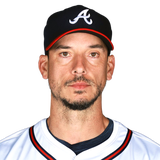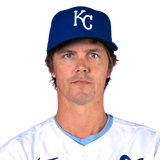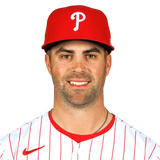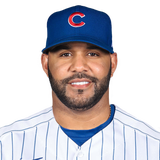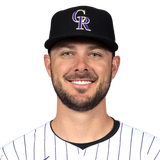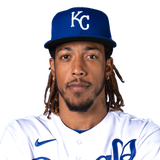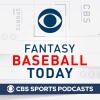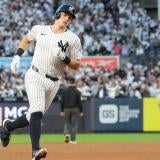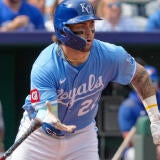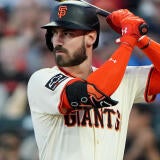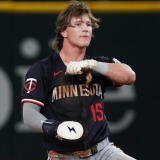| ||||||||||
2020 Fantasy Baseball Rankings: Breaking down players 41 through 50, from Clayton Kershaw to Adalberto Mondesi
Clayton Kershaw in the fourth round? You'll take it. Here's who else goes in this range.
What separates the first rounders from the rest of the players in Fantasy baseball isn't just their upside. Looking at the players ranked 41 through 50 in 2020, you've got recent Cy Young contenders like Blake Snell and Aaron Nola, plus maybe the premiere base stealer in MLB today in Adalberto Mondesi. There's no lack of upside here, but they fall because they're risky. If they hit, you're gonna have a great season. If not, well ... you can read on and find out for yourself.
Consider this your reintroduction to the 2020 draft pool, accounting for all the changes that have taken place since and because of the coronavirus lockdown. Over the span of 20 articles, Scott White and Chris Towers look at the top 200 in Scott's Rotisserie rankings, highlighting the reasons for and against drafting each. It makes for a well-rounded education on every player, revealing critical details that more argument-based evaluations might conveniently leave out.
So if you want a crash course on this year's player pool, particularly in light of more recent events, you've come to the right place. We're going through Nos. 41-50. And you can find the rest right here: 1-10 | 11-20 | 21-30 | 31-40 | 41-50 | 51-60 | 61-70 | 71-80 | 81-90 | 91-100 | 101-110 | 111-120 | 121-130 | 131-140 | 141-150 | 151-160 | 161-170 | 171-180 | 181-190 | 191-200
No. 41-50
The Case For: Dogged by back issues in recent years, Kershaw managed to make it through 2019 unscathed (well, apart from missing the first couple weeks with shoulder inflammation), which quieted some of the decline talk. Some of the skills that had diminished showed signs of recovery, too. His swinging-strike rate was back up to 15th among qualifiers — better than teammate Walker Buehler, actually — and he was back to striking out more than a batter per inning. Seven-inning starts remained a common occurrence, and there really wasn't a point in the year when anyone had reason to doubt his ace standing.
The Case Against: OK, so he skated by for another year, but there are still some red flags. He's an actual soft-tosser now, averaging just 90 mph on his fastball. It means he's giving up harder contact, which is of course never good in this environment, so you have to expect the career-worst home run rate will keep going up. He may have already had some good luck in that regard, as his 3.50 xFIP and 3.77 SIERA attest. -Scott White
| ||||||||||
The Case For: Nola, like many of his ace brethren, had trouble adapting to the lower seams on the baseballs in April, but once he found his groove in May, he was back to delivering high-end numbers, specifically a 2.96 ERA, 1.13 WHIP and 10.2 K/9 over the next four months. He was no stranger to the seventh inning, making it there 17 times in his 34 starts, and it's that sort of workload that helps set him apart even in a year when the ratios aren't as strong. We shouldn't lose sight of the upside either: He finished third in a crowded NL Cy Young race two years ago.
The Case Against: How sneaky of me to leave out September when describing Nola's turnaround, referring to only "the next four months." He had a 6.51 ERA in that fifth and final month, and that sour taste will be a lasting one for many. Though he remained efficient in terms of pitch counts, Nola's control wasn't as pinpoint as we knew it to be at the start of his big-league career, perhaps in part because of ousted pitching coach Chris Young's poor fit. Nola has already expressed his preference for new pitching coach Bryan Price old-school methods of pitching down in the zone. -Scott White
| ||||||||||
The Case For: Morton is as good as most of the pitchers going two to three rounds ahead of him. He didn't lose anything upon leaving the Astros, and he actually posted a career-best strikeout rate, along with his lowest walk rate since 2012. Morton also got close to 200 innings for the first time in his career and also threw at least six innings in 22 of his 33 starts. With two near-elite seasons in a row under his belt, Morton looks like a steal at his current cost.
The Case Against: He's 35, and 2019 was just the second time he's ever even thrown 170 innings in a season. That might be overstating his durability issues just a tad — Morton has made at least 28 starts in three straight seasons — but it's hard to ignore his track record and age. Morton could have another great season or two left in him, but you're betting against history, both his own and the population as a whole. There's great upside here, but there's also some risk. -Chris Towers
| ||||||||||
The Case For: You remember 2018, right? Snell was a revelation then, claiming the AL Cy Young despite a workload disadvantage because a 1.89 ERA is just bonkers in today's hitting environment. Well, many of the attributes that contributed to that 1.89 ERA were just as present in 2019. He was actually a superior bat-misser, delivering a swinging-strike rate that would have been a distant first among qualifiers (with Gerrit Cole, Max Scherzer and Justin Verlander being the next three, in case you're wondering), and his 3.31 xFIP certainly wasn't out of line with the 3.16 mark he produced in 2018.
The Case Against: There are the theoretical stats, and then there are the actual stats. And while Snell may have measured up in the former in 2019, he most certainly did not in the latter. Sure, injuries were partly to blame — whenever he seemed to be finding his groove, his elbow would start barking, ultimately requiring surgery to remove loose bodies — but they only contribute to the durability issues already holding him back. (You'll note he had some elbow issues this spring.) Only twice in his 23 starts did he exceed six innings last year, and seeing as he finished with only 107 innings, you have to assume the Rays will baby him yet again. -Scott White
| ||||||||||
The Case For: At the most volatile but most essential of positions, Greinke has been a model of consistency, only once in the past seven years delivering an ERA over 3.21 and only twice falling short of 200 innings. He pounds the strike zone, seems to get better the third time through the lineup and thrives on being the opposite of everything hitters are used to seeing these days. And now beginning his first full year with the Astros, he has an easy path to a big win total as well.
The Case Against: For as reliable as Greinke has been, there's always a sense he's hanging by a thread, and now that he's 36, there may be more truth to it than ever. He has had to make do with less and less on his fastball in recent years, and one of these years when he shows up to spring training throwing 82 mph, he won't have as easy a time getting it back. For all the ways he's an ace, he falls short in the strikeout column, which can put you at a disadvantage in a Rotisserie league if you don't draft a couple big arms ahead of him. -Scott White
| ||||||||||||
The Case For: The production finally caught up to the scouting reports. Meadows mostly managed to stay healthy and put together his first season with an OPS over .900 since his days in the lower minors. Scouts always loved the potential, and we saw why in 2019 as he put together a solid five-category showing. There might even be more upside in the speed department than we saw as Meadows had 17 steals in just 128 games between the majors and minors in 2018. Is there 30-20 potential here? Only four players did that in 2019, and they're all first-rounders.
The Case Against: 2019 could have been Meadows finally living up to his potential, or he could have been playing a bit over his head. He outperformed his expected wOBA just a bit, but he also probably had some good luck on his side against lefties, as he struck out nearly 30% of the time and had a .352 BABIP to prop up his .837 OPS. If he regresses against same-handed pitching in 2020, the Rays are uniquely well equipped to insert him in a platoon and have shown a willingness to do that in the past. Meadows should hit well enough against lefties to keep his bat in the lineup every day, but that's the risk here. -Chris Towers
| ||||||||||||
The Case For: You need steals, right? Merrifield has led the AL in them two of the past three years, and getting that sort of contribution from the relatively weak second base spot sets you up nicely to load up on big bats at the positions that offer more of them. It's worth noting that Merrifield himself is no slouch at the plate, having hit .300 with double-digit home runs in back-to-back years. And because he has emerged as one of the game's preeminent line-drive hitters, ranking up there with Freddie Freeman, those contributions appear to be pretty safe.
The Case Against: What may not be safe are the stolen bases themselves. I mentioned Merrifield led the AL two of the past three years? Last year was the year he didn't, finishing with only 20, and worse yet, he was caught on one-third of his attempts. He's 31 now, so he may have reached the stage in his career when he's asked (or chooses) to run less. And since stolen bases are his main appeal, that would be a problem. -Scott White
| ||||||||||||
The Case For: Stolen bases. Even in all those instances when his playing time fluctuated and his bat failed to deliver, Villar has been one of the most reliable contributors in that ever-elusive category, swiping at least 35 bags in three of the past four seasons (and 23 in the other). Those numbers are pretty valuable on their own in Rotisserie leagues, and then when he has a year like last year when he also performs at the plate, it's enough to move him into the elites in that format. The Marlins made a point to acquire him this offseason and thus figure to be more deliberate in their use of him than maybe some of his previous organizations were.
The Case Against: Of course, the biggest reason the Marlins acquired Villar is because he was dirt cheap. The Orioles were willing to waive him if they didn't find a taker, which tells you a little about what they thought of his chances for a repeat. Even with the changing dimensions, Marlins Park projects to be a much different venue than Camden Yards, where Villar hit two-thirds of his home runs last year. And considering he had just a .249 xBA and .313 xwOBA, his production is due for a downturn anyway. If he doesn't hit the ground running, the rebuilding Marlins might turn over Villar's at-bats to someone younger or trade him to be a reserve for a contender. -Scott White
| ||||||||||||
The Case For: The former Rookie of the Year and MVP recovered from an injury-plagued 2018 to deliver numbers more befitting his profile. Of course, the numbers didn't exactly stand out in such a power-laden environment, but they didn't invite much criticism either. His plus on-base skills give him a higher run-scoring capacity than the average slugger, too.
The Case Against: Obviously, Bryant is still a quality contributor, but it's getting harder to remember a time when a player with his profile justified a first-round pick. The redundancies are plentiful at third base in particular, and at this point, it's not clear that he has an upside advantage either. He doesn't hit the ball especially hard for someone who's chiefly a home run hitter, and it means he may not have the capacity for much more than the 31 he hit last year. In fact, his xBA and xwOBA both suggest he actually overachieved, and by no small degree. -Scott White
| ||||||||||||
The Case For: Mondesi wasn't the league-winning superstar many hoped he would be in 2019, but he was still pretty great, specifically with the steals. There may not be a player with as much stolen base upside as Mondesi, and that alone makes him worth targeting in all Roto leagues. And since there's enough pop that 15 homers is a reasonable expectation and 20 isn't out of the question (not in a full-length season, anyway), this isn't just a one-trick pony.
The Case Against: Mondesi strikes out a ton, which limits his batting average upside, and he basically never walks, which limits his opportunities for steals and runs. You can still bet on him getting 40-plus steals, but if the batting average craters, he could be a huge drain in three categories. There's also the small matter of him working his way back from a torn labrum in his shoulder. If you want to see how bad things can get for Mondesi, Jonathan Villar's 2017 is a pretty good test case. -Chris Towers
So which sleepers should you snatch in your draft? And which undervalued first baseman can help you win a championship? Visit SportsLine now to get rankings for every single position, all from the model that called Kenta Maeda's huge breakout last season, and find out.






